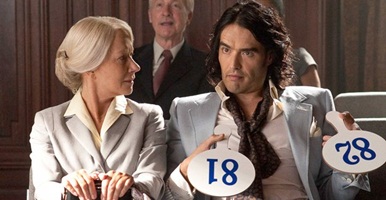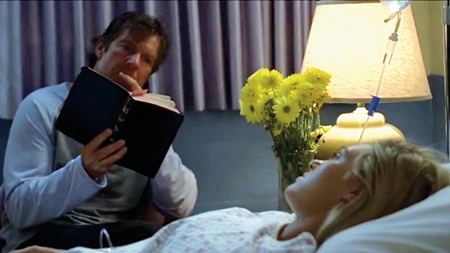 This weekend sees the arrival of yet another remake into theaters, the reimagining of the comedy from the early 80s, Arthur. By every indication from its announced production this was going to be misguided affair, and in fact it is even worse. Russel Brand does not possess a fraction of the charm and timing of the late Dudley Moore, but worse than that is what has occurred with Arthur himself.
This weekend sees the arrival of yet another remake into theaters, the reimagining of the comedy from the early 80s, Arthur. By every indication from its announced production this was going to be misguided affair, and in fact it is even worse. Russel Brand does not possess a fraction of the charm and timing of the late Dudley Moore, but worse than that is what has occurred with Arthur himself.
It does not take long at all to discover how far from the original grace this redux has landed. This film begins with a car chase, of all things. But later something truly reprehensible takes place. This being a new era the idea of a rakish, fun-loving alcoholic cannot be left to stand; after all, audiences need to be lectured that this sort of thing is a damaging character trait. Therefore the titular scamp actually goes to an Alcoholics Anonymous meeting. Sure it does not go swimmingly but the very concept is anathema to the character entirely.
In the 1981 original Arthur was a lush of a playboy, and the movie was unapologetic about his drinking. Sure, numerous characters lectured Arthur about his condition, with many hectoring him that he needed to stop. But his drinking was a part of his character, and furthermore the audiences understood as much. We grasped that his inebriation was an extension of his insecurities and loneliness, which actually led to his becoming a sympathetic character. More important we did not need the production team to stand behind us with a tapping foot, letting us know that this was not a positive role model. His weakness was recognized and we hoped for some form of redemption. There was no need to hand out pamphlets detailing the dangers of binge drinking.
Other elements from the original as well would need to be scrubbed in this age of public-service cinema. Take the early scenes involving Arthur Bach picking up a hooker. That practice alone is not likely to be given screen time these days, but the darker elements certainly would not make it in today’s scripts. First he chooses from a pair of street walkers and then tells his driver to give cash to the other woman for coming in second. Considering the Oscars are no longer permitted to declare someone a “winner” this display will not be seen. Later over dinner the chosen prostitute tells a tale of her mother dying when she was seven years old, and then her father raping her when she was a teen, but the drunken Arthur quips, “So you had six relatively good years.” You cannot make light of female abuse today, and thus we are given our contemporary billionaire attending a self-help seminar.

The political-correctness wave that swept over our culture decades back has brought us to this. The MPAA has often been pegged as the source of this form of censure, but just as often the studios have freely muzzled themselves in the name of protecting sensibilities. Activists armed with fax machines and press releases stand at the ready to fire off rebukes about perceived slights and dangers shown on screen. Even an overlooked comedy like The Dilemma came under fire for a toss-away line about a type of vehicle being labeled as “gay” and spurned a social debate. Egregious behavior or insensitive portrayals have been targeted so often that now Hollywood has adopted many of these hyper-restrictive standards. Children are shielded from impressionable actions and fractious special-interest groups are kept at bay with a voluntary policing of content. The result is often an impotent product.
This need to both protect the impressionable and mollify the offended has brought us to a curious dichotomy. At times Hollywood seems to be forwarding one kind of social agenda while contradicting itself in other areas. Stoner comedies for instance have become an accepted genre, but while marijuana-centric titles such as this weekend’s Your Highness are becoming acceptable Hollywood has taken pains in recent years to scale back depictions of cigarette use. Last month a children’s advocacy group came out in opposition to the animated Rango, suggesting it should have been given a R-rating because of scenes involving cigar smoking. This seemingly was a worse influence on youths than the scenes where the characters were involved with guns – firing up a stogie is worse than using a firearm. This reminds of the motivations behind Charlie’s Angels years back, when producer/star Drew Barrymore often heralded in interviews her edict banning the use of guns for the angels. The repeated scenes of hand-to-hand combat, explosions and even the use of a rocket launcher were apparently not considered violent.
It used to be that films drove the national narrative and questioned mores. Convention was challenged routinely, but these days it is just as likely the fear of upsetting groups drives decisions. Also opening this weekend is “Soul Surfer”, the true story of a teenaged female surfer returning to the sport following the loss of her arm in a shark attack. In some test screenings the words “Holy Bible” had been digitally scrubbed from the front of said book by the producers as an attempt to not offend potential audiences. Bear in mind this is in a film where the girl’s religion is a center point to the story, but the fear that some may take offense and ticket purchases could be stunted was a factor.
This is where we are as viewing nation. Thirty years ago a drunken boor was free to cackle and harass before he came to realize that he had to learn hard lessons. These days he gets a counselor – who wouldn’t want to see that? Check out this weekend’s box office returns and you may find out.